Abstract
Infection of athymic mice with defined populations of acyclovir-susceptible (thymidine kinase [TK]-positive) and acyclovir-resistant (TK-deficient or TK-altered) herpes simplex virus type 1 strains was used to simulate herpetic skin disease of the immunocompromised host. In vitro characterization of the defined virus mixtures revealed that the dye uptake method was quite sensitive in the detection of small amounts (3 to 9%) of acylovir-resistant virus. Mice infected with homogeneous virus populations exhibited a good correlation between clinical response and the in vitro drug susceptibility of the infecting virus. Animals infected with defined mixtures of viruses exhibited varied patterns of infection and responses to acyclovir treatment. However, disease severity was useful in predicting the TK phenotype of virus recovered from lesions. Pathogenic, TK-altered virus was responsible for progressive disease in animals receiving low-dose (0.25-mg/ml) prophylactic acyclovir or high-dose (1.25-mg/ml) delayed therapy. Although this mutant was recovered infrequently, it was responsible for clinically significant disease in the animals from which it was isolated.
Full text
PDF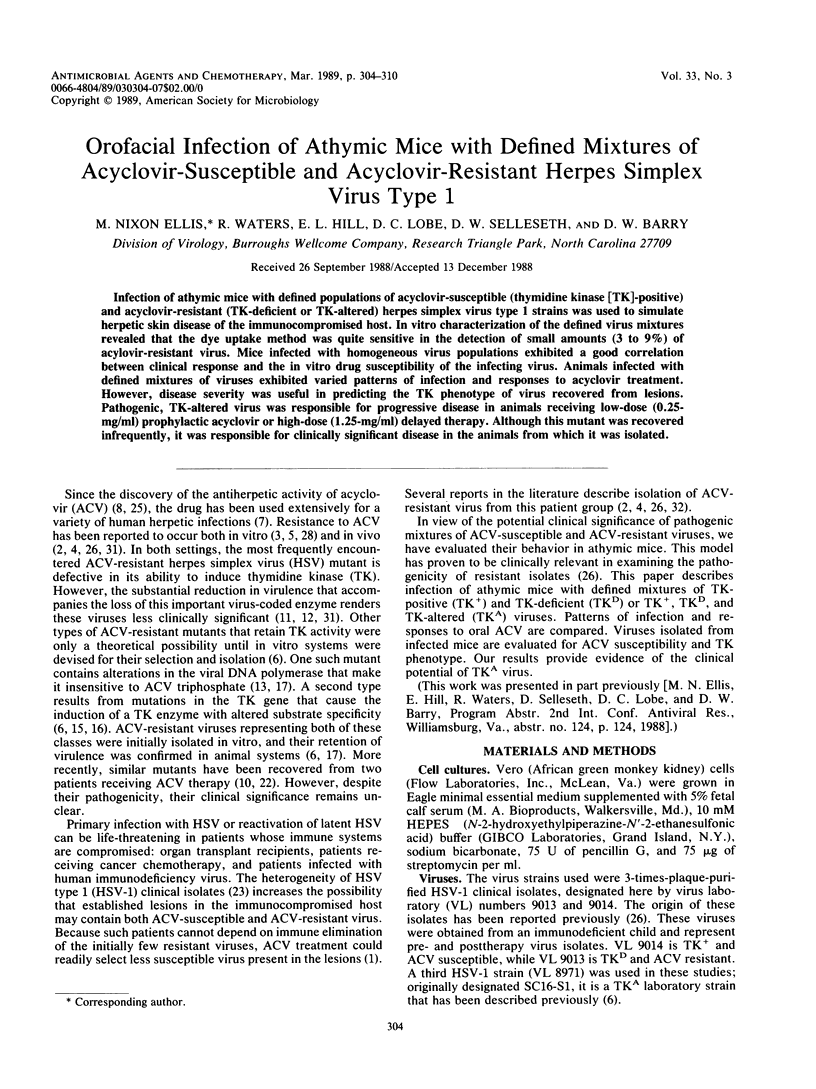
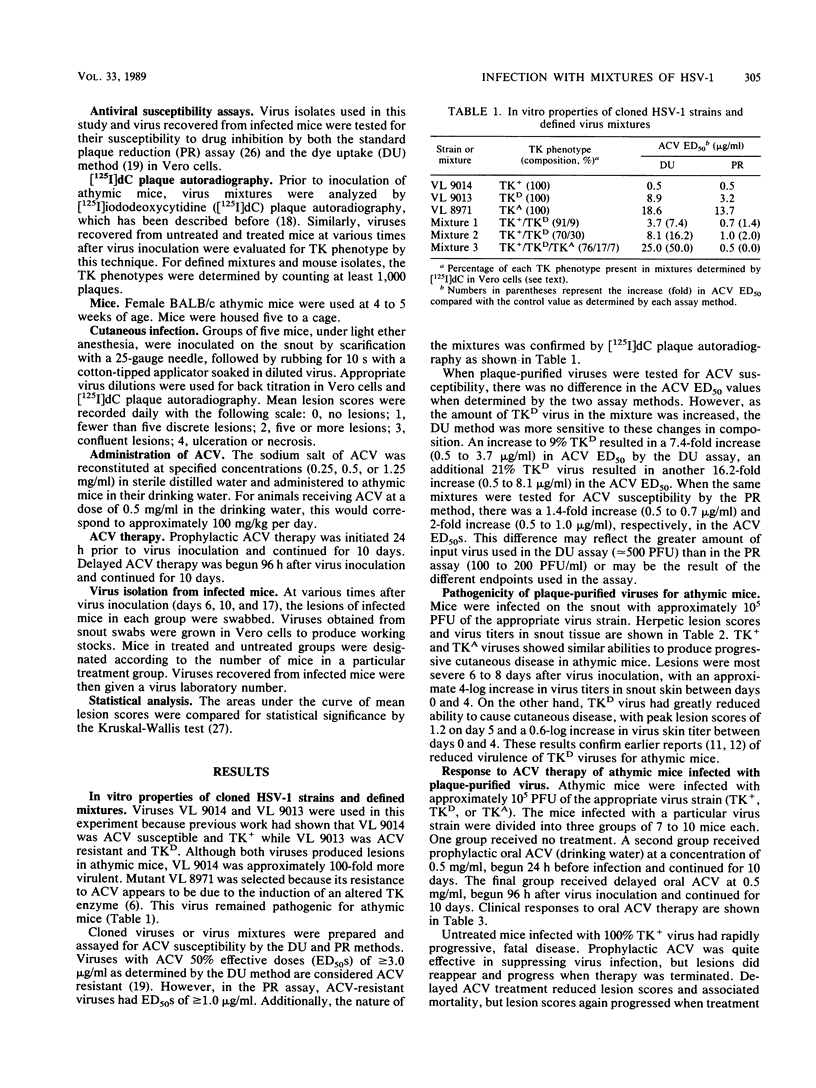
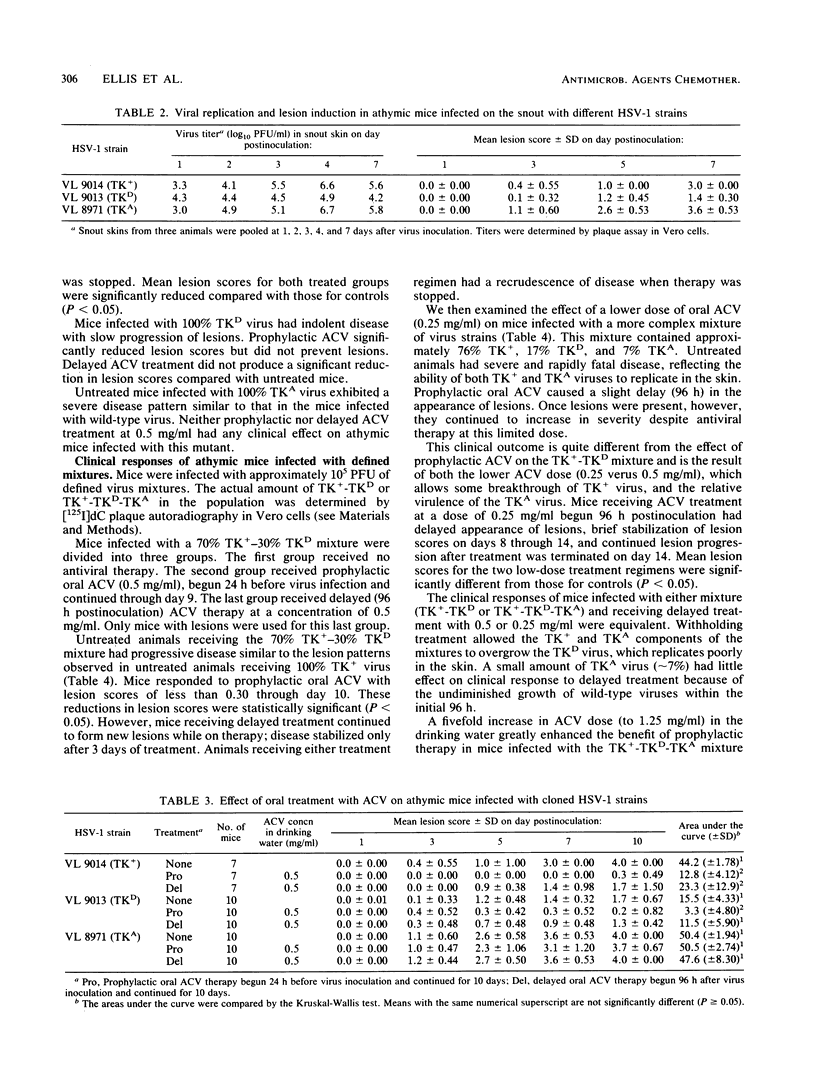
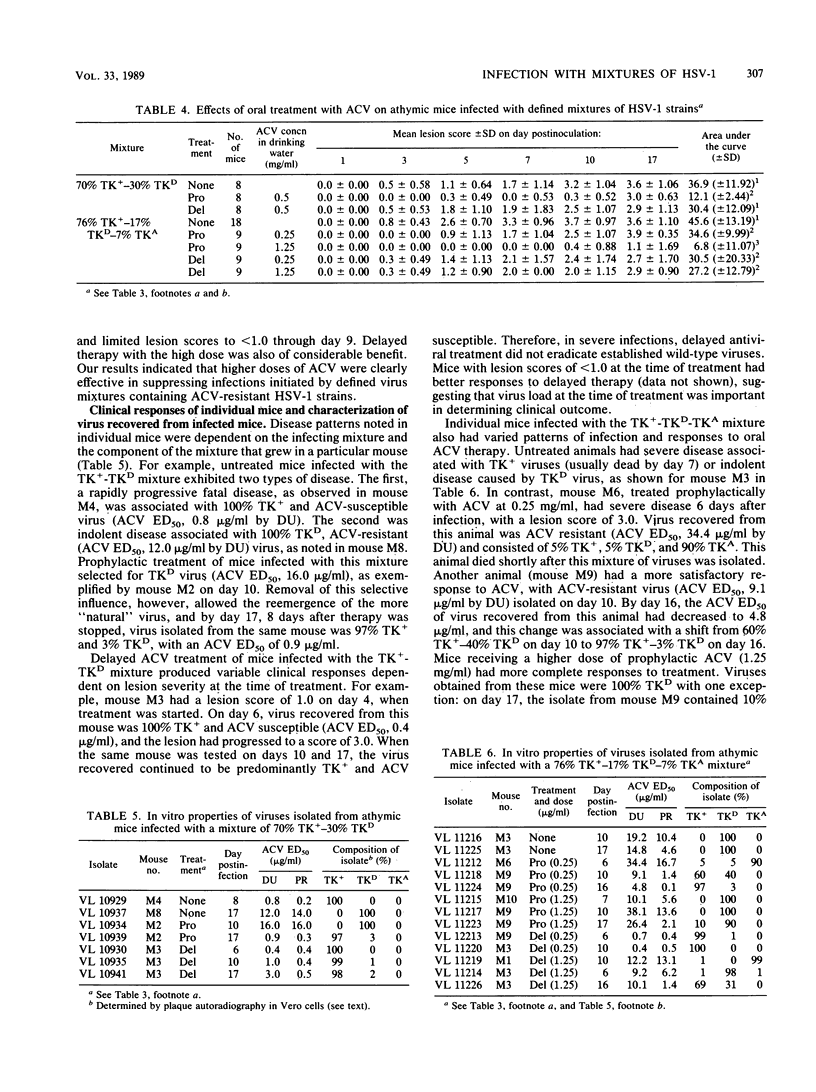
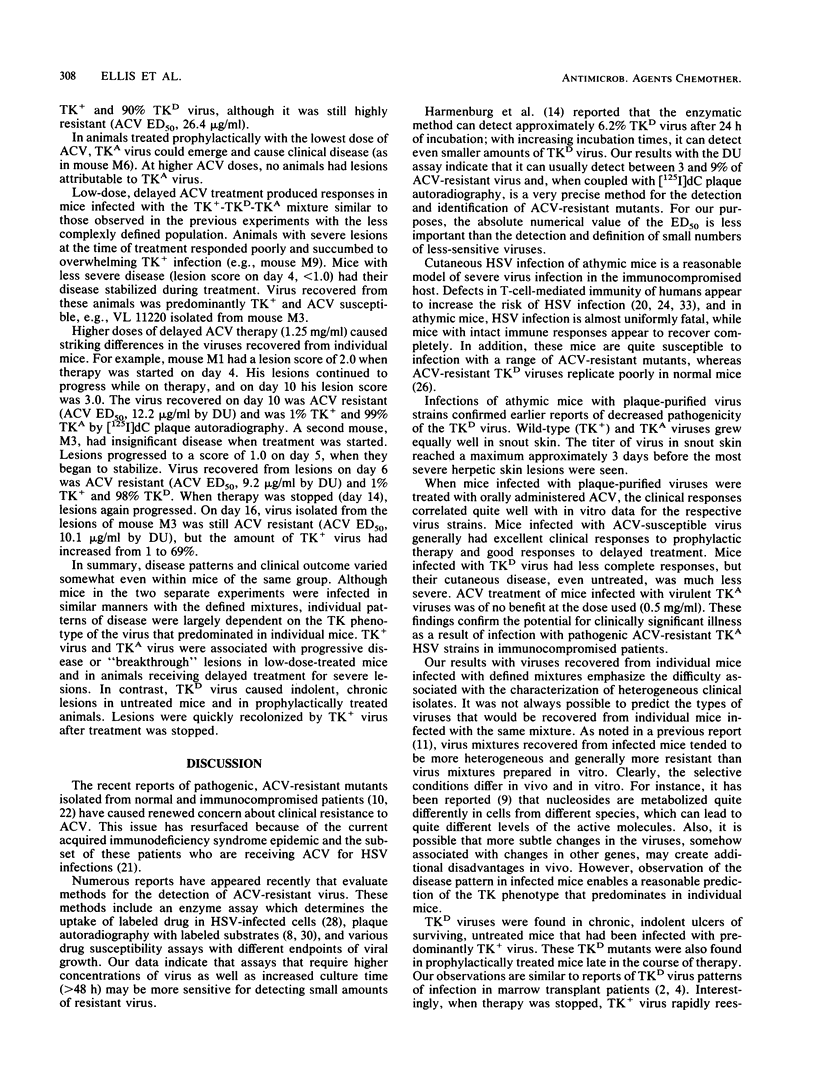
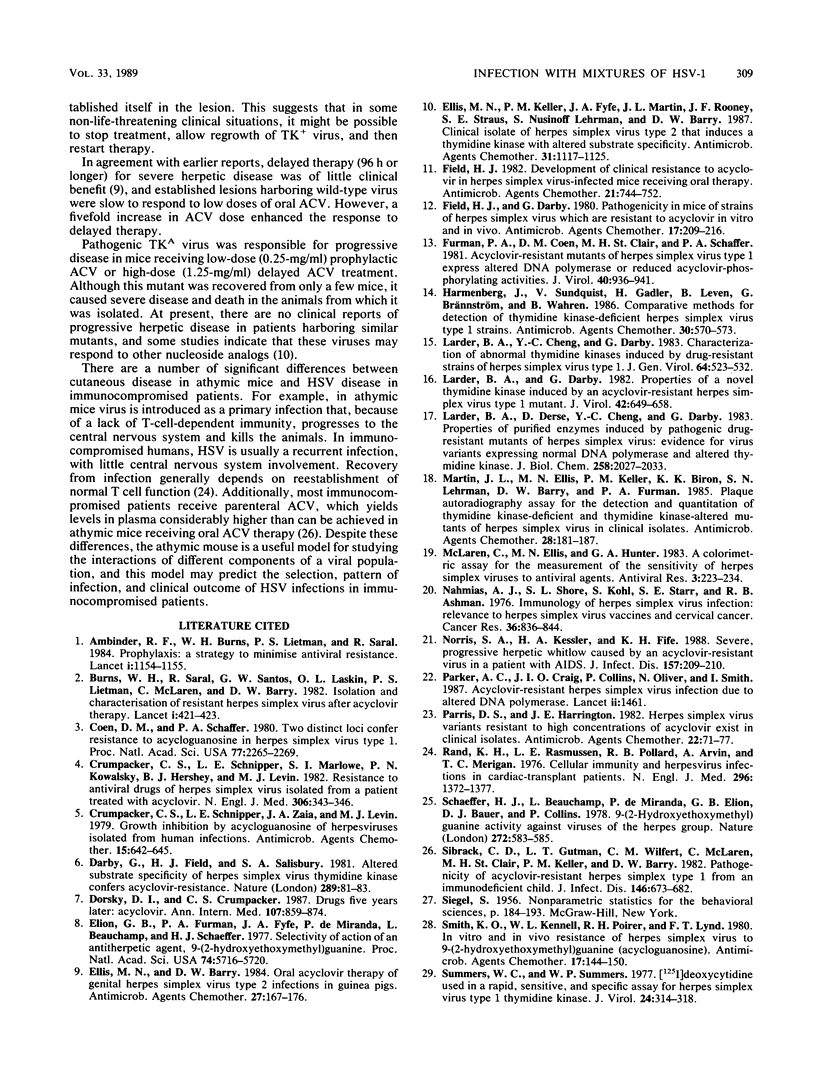
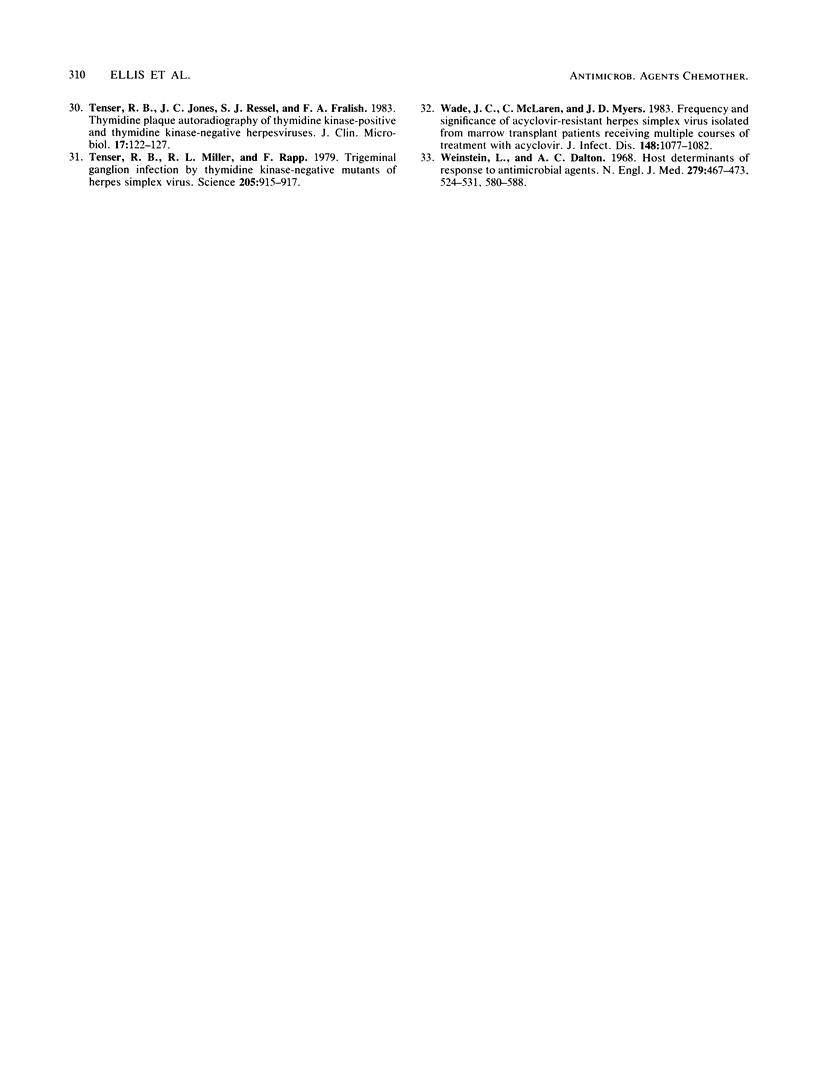
Selected References
These references are in PubMed. This may not be the complete list of references from this article.
- Ambinder R. F., Burns W. H., Lietman P. S., Saral R. Prophylaxis: a strategy to minimise antiviral resistance. Lancet. 1984 May 26;1(8387):1154–1155. doi: 10.1016/s0140-6736(84)91396-5. [DOI] [PubMed] [Google Scholar]
- Burns W. H., Saral R., Santos G. W., Laskin O. L., Lietman P. S., McLaren C., Barry D. W. Isolation and characterisation of resistant Herpes simplex virus after acyclovir therapy. Lancet. 1982 Feb 20;1(8269):421–423. doi: 10.1016/s0140-6736(82)91620-8. [DOI] [PubMed] [Google Scholar]
- Coen D. M., Schaffer P. A. Two distinct loci confer resistance to acycloguanosine in herpes simplex virus type 1. Proc Natl Acad Sci U S A. 1980 Apr;77(4):2265–2269. doi: 10.1073/pnas.77.4.2265. [DOI] [PMC free article] [PubMed] [Google Scholar]
- Crumpacker C. S., Schnipper L. E., Marlowe S. I., Kowalsky P. N., Hershey B. J., Levin M. J. Resistance to antiviral drugs of herpes simplex virus isolated from a patient treated with acyclovir. N Engl J Med. 1982 Feb 11;306(6):343–346. doi: 10.1056/NEJM198202113060606. [DOI] [PubMed] [Google Scholar]
- Crumpacker C. S., Schnipper L. E., Zaia J. A., Levin M. J. Growth inhibition by acycloguanosine of herpesviruses isolated from human infections. Antimicrob Agents Chemother. 1979 May;15(5):642–645. doi: 10.1128/aac.15.5.642. [DOI] [PMC free article] [PubMed] [Google Scholar]
- Darby G., Field H. J., Salisbury S. A. Altered substrate specificity of herpes simplex virus thymidine kinase confers acyclovir-resistance. Nature. 1981 Jan 1;289(5793):81–83. doi: 10.1038/289081a0. [DOI] [PubMed] [Google Scholar]
- Dorsky D. I., Crumpacker C. S. Drugs five years later: acyclovir. Ann Intern Med. 1987 Dec;107(6):859–874. doi: 10.7326/0003-4819-107-6-859. [DOI] [PubMed] [Google Scholar]
- Elion G. B., Furman P. A., Fyfe J. A., de Miranda P., Beauchamp L., Schaeffer H. J. Selectivity of action of an antiherpetic agent, 9-(2-hydroxyethoxymethyl) guanine. Proc Natl Acad Sci U S A. 1977 Dec;74(12):5716–5720. doi: 10.1073/pnas.74.12.5716. [DOI] [PMC free article] [PubMed] [Google Scholar]
- Ellis M. N., Barry D. W. Oral acyclovir therapy of genital herpes simplex virus type 2 infections in guinea pigs. Antimicrob Agents Chemother. 1985 Feb;27(2):167–171. doi: 10.1128/aac.27.2.167. [DOI] [PMC free article] [PubMed] [Google Scholar]
- Ellis M. N., Keller P. M., Fyfe J. A., Martin J. L., Rooney J. F., Straus S. E., Lehrman S. N., Barry D. W. Clinical isolate of herpes simplex virus type 2 that induces a thymidine kinase with altered substrate specificity. Antimicrob Agents Chemother. 1987 Jul;31(7):1117–1125. doi: 10.1128/aac.31.7.1117. [DOI] [PMC free article] [PubMed] [Google Scholar]
- Field H. J., Darby G. Pathogenicity in mice of strains of herpes simplex virus which are resistant to acyclovir in vitro and in vivo. Antimicrob Agents Chemother. 1980 Feb;17(2):209–216. doi: 10.1128/aac.17.2.209. [DOI] [PMC free article] [PubMed] [Google Scholar]
- Field H. J. Development of clinical resistance to acyclovir in herpes simplex virus-infected mice receiving oral therapy. Antimicrob Agents Chemother. 1982 May;21(5):744–752. doi: 10.1128/aac.21.5.744. [DOI] [PMC free article] [PubMed] [Google Scholar]
- Furman P. A., Coen D. M., St Clair M. H., Schaffer P. A. Acyclovir-resistant mutants of herpes simplex virus type 1 express altered DNA polymerase or reduced acyclovir phosphorylating activities. J Virol. 1981 Dec;40(3):936–941. doi: 10.1128/jvi.40.3.936-941.1981. [DOI] [PMC free article] [PubMed] [Google Scholar]
- Harmenberg J., Sundqvist V. A., Gadler H., Levén B., Brännström G., Wahren B. Comparative methods for detection of thymidine kinase-deficient herpes simplex virus type 1 strains. Antimicrob Agents Chemother. 1986 Oct;30(4):570–573. doi: 10.1128/aac.30.4.570. [DOI] [PMC free article] [PubMed] [Google Scholar]
- Larder B. A., Cheng Y. C., Darby G. Characterization of abnormal thymidine kinases induced by drug-resistant strains of herpes simplex virus type 1. J Gen Virol. 1983 Mar;64(Pt 3):523–532. doi: 10.1099/0022-1317-64-3-523. [DOI] [PubMed] [Google Scholar]
- Larder B. A., Darby G. Properties of a novel thymidine kinase induced by an acyclovir-resistant herpes simplex virus type 1 mutant. J Virol. 1982 May;42(2):649–658. doi: 10.1128/jvi.42.2.649-658.1982. [DOI] [PMC free article] [PubMed] [Google Scholar]
- Larder B. A., Derse D., Cheng Y. C., Darby G. Properties of purified enzymes induced by pathogenic drug-resistant mutants of herpes simplex virus. Evidence for virus variants expressing normal DNA polymerase and altered thymidine kinase. J Biol Chem. 1983 Feb 10;258(3):2027–2033. [PubMed] [Google Scholar]
- Martin J. L., Ellis M. N., Keller P. M., Biron K. K., Lehrman S. N., Barry D. W., Furman P. A. Plaque autoradiography assay for the detection and quantitation of thymidine kinase-deficient and thymidine kinase-altered mutants of herpes simplex virus in clinical isolates. Antimicrob Agents Chemother. 1985 Aug;28(2):181–187. doi: 10.1128/aac.28.2.181. [DOI] [PMC free article] [PubMed] [Google Scholar]
- McLaren C., Ellis M. N., Hunter G. A. A colorimetric assay for the measurement of the sensitivity of herpes simplex viruses to antiviral agents. Antiviral Res. 1983 Nov;3(4):223–234. doi: 10.1016/0166-3542(83)90001-3. [DOI] [PubMed] [Google Scholar]
- Nahmias A. J., Shore S. L., Kohl S., Starr S. E., Ashman R. B. Immunology of herpes simplex virus infection: relevance to herpes simplex virus vaccines and cervical cancer. Cancer Res. 1976 Feb;36(2 Pt 2):836–844. [PubMed] [Google Scholar]
- Norris S. A., Kessler H. A., Fife K. H. Severe, progressive herpetic whitlow caused by an acyclovir-resistant virus in a patient with AIDS. J Infect Dis. 1988 Jan;157(1):209–210. doi: 10.1093/infdis/157.1.209. [DOI] [PubMed] [Google Scholar]
- Parker A. C., Craig J. I., Collins P., Oliver N., Smith I. Acyclovir-resistant herpes simplex virus infection due to altered DNA polymerase. Lancet. 1987 Dec 19;2(8573):1461–1461. doi: 10.1016/s0140-6736(87)91157-3. [DOI] [PubMed] [Google Scholar]
- Parris D. S., Harrington J. E. Herpes simplex virus variants restraint to high concentrations of acyclovir exist in clinical isolates. Antimicrob Agents Chemother. 1982 Jul;22(1):71–77. doi: 10.1128/aac.22.1.71. [DOI] [PMC free article] [PubMed] [Google Scholar]
- Rand K. H., Rasmussen L. E., Pollard R. B., Arvin A., Merigan T. C. Cellular immunity and herpesvirus infections in cardiac-transplant patients. N Engl J Med. 1977 Jun 16;296(24):1372–1377. doi: 10.1056/NEJM197706162962402. [DOI] [PubMed] [Google Scholar]
- Schaeffer H. J., Beauchamp L., de Miranda P., Elion G. B., Bauer D. J., Collins P. 9-(2-hydroxyethoxymethyl) guanine activity against viruses of the herpes group. Nature. 1978 Apr 13;272(5654):583–585. doi: 10.1038/272583a0. [DOI] [PubMed] [Google Scholar]
- Sibrack C. D., Gutman L. T., Wilfert C. M., McLaren C., St Clair M. H., Keller P. M., Barry D. W. Pathogenicity of acyclovir-resistant herpes simplex virus type 1 from an immunodeficient child. J Infect Dis. 1982 Nov;146(5):673–682. doi: 10.1093/infdis/146.5.673. [DOI] [PubMed] [Google Scholar]
- Smith K. O., Kennell W. L., Poirier R. H., Lynd F. T. In vitro and in vivo resistance of herpes simplex virus to 9-(2-hydroxyethoxymethyl)guanine (acycloguanosine). Antimicrob Agents Chemother. 1980 Feb;17(2):144–150. doi: 10.1128/aac.17.2.144. [DOI] [PMC free article] [PubMed] [Google Scholar]
- Summers W. C., Summers W. P. [125I]deoxycytidine used in a rapid, sensitive, and specific assay for herpes simplex virus type 1 thymidine kinase. J Virol. 1977 Oct;24(1):314–318. doi: 10.1128/jvi.24.1.314-318.1977. [DOI] [PMC free article] [PubMed] [Google Scholar]
- Tenser R. B., Jones J. C., Ressel S. J., Fralish F. A. Thymidine plaque autoradiography of thymidine kinase-positive and thymidine kinase-negative herpesviruses. J Clin Microbiol. 1983 Jan;17(1):122–127. doi: 10.1128/jcm.17.1.122-127.1983. [DOI] [PMC free article] [PubMed] [Google Scholar]
- Tenser R. B., Miller R. L., Rapp F. Trigeminal ganglion infection by thymidine kinase-negative mutants of herpes simplex virus. Science. 1979 Aug 31;205(4409):915–917. doi: 10.1126/science.224454. [DOI] [PubMed] [Google Scholar]
- Wade J. C., McLaren C., Meyers J. D. Frequency and significance of acyclovir-resistant herpes simplex virus isolated from marrow transplant patients receiving multiple courses of treatment with acyclovir. J Infect Dis. 1983 Dec;148(6):1077–1082. doi: 10.1093/infdis/148.6.1077. [DOI] [PubMed] [Google Scholar]
- Weinstein L., Dalton A. C. Host determinants of response to antimicrobial agents. N Engl J Med. 1968 Aug 29;279(9):467–contd. doi: 10.1056/NEJM196808292790905. [DOI] [PubMed] [Google Scholar]


